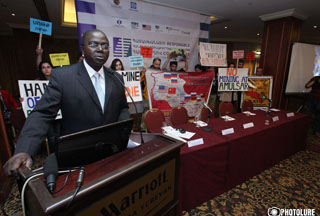Is responsible mining possible in Armenia?

“Responsible mining: opportunities and challenges” conference that was held in Yerevan on March 25-26 started with scandal. Even in the end of the conference there was still active debate about environmental issues.
The international conference was organized by the Armenian government, EBRD, the International Financial Corporation, and the Embassies of the US, Great Britain, Germany in Armenia, and the Canadian government. Environmental groups participated in the conference as well. They held demonstration at the Marriott hotels with posters writing “You mine we die,” “Hand off Armenia” and other similar slogans. The environmental groups entered the conference room and gave glasses full of dirty water taken from the street to government representatives, including Armen Movsisyan, minister of energy and natural resources. Environmental protection minister Aram Harutyunyan flipped out and attracted the attention of media with slang speech. The Prime-Minister was invited but did not show up. However, he invited activists for dialogue remotely.
The guests did their best not to let the organizers feel bad. For example, US Ambassador John Heffern said that the demonstration of activists was a sign of civic society development and activity.
There were no other incidents before the end of the conference, however still there was tension. During the Q&A session representatives of non-for-profit organizations opposed to the statement of the government representative saying that no new metallic mines had been used in Armenia during the past 20-25 years. Some participants criticized NGOs as well but the moderators of the conference made the parties come down. What did this conference give? The goal of the conference was to introduce the modern best mining practices to mining sector stakeholders in Armenia and make dialogue easier. From the point of view of experience and information it was successful as high caliber professionals attended the conference. However, the dialogue was failed because for dialogue there must be willingness among both parties. The maximum achievement was that the parties introduced each other’s opinions. However, there are some conclusions as a result of this conference.
Necessary realities
Nobody refuses the fact that mining affects the environment. For example, Hrach Jabrayan, vice-president and general manager of Dundee Precious Metals company, says that it was a fact that mining affects the environment. However, he believes it is impossible without mining. Accordingly, people should not categorically oppose to mining but should look forward and discuss ways that could minimize the impact of mining, derive benefits and compensate for losses. Everywhere in the world in parallel with technology development the impact of mining is being reduced, and environmental requirements are being restricted. Didier Fohlen, executive vice president of Lydian International company that manages Amulsar mine, said that it was not so easy to stop mining, and it would take dozens of years. He recommends all parties to look forward. He also focused on the fact that twenty years ago mining companies were not doing anything for community development but their company implemented social projects even before exploring the mine. Fohlen believes the Armenian government should give an opportunity to such companies to work, do effective mining and meanwhile impose strict standards. However, as the legal system in Armenia is not integral, such standards and legal requirements are weak. Sonya Ayvazyan, president of the Transparency International asks why companies should do the “right” mining if they are not going to bear and responsibility. This means for the mining companies the biggest role is not given to the state control but social responsibility and pressure on the part of environmental groups.
Extremist and constructive environmentalists
Even though it was clear before the conference too, but this event proved that environmentalists in Armenia divide in two parts. The first group can be called as “extremists” who are against mining in general and believe Armenia does not need this sector. This group is suggesting to develop other sectors, however so far they have not developed any scientifically proven sector for development, which would compensate for the losses as a result of refusing mining. Hardly may it be possible to enter into dialogue with this group.
The second group consists of constructive environmentalists who think that mining is not the best thing to do but agree that it is impossible without it. Instead of that they demand strict requirements and proper control. For instance, environmentalist Karine Danielyan says they are open for dialogue but there are issues they categorically reject and cannot be discussed. For example, mining in forest areas is unacceptable.
Michael Besonside, who has experience with the US Forest Service, suggested to map the areas that have historical and cultural significance for Armenia in advance to prohibit by law mining in those areas.
One of the main problems in the mining sector is that this business is alienated from the society. For example, in many situations local communities are for mining but environmental protection groups are against. This means that such environmental groups do not represent the public opinion but their professional standpoint. As a result, in Armenia the triangle composed of mining companies, the society and government become a square that adds the society as a separate party to the process.
The fourth side of the triangle
This is the most difficult and unclear side. This is true about not only the mining sector but other sectors in Armenia as well. The mainstream opposition is against the government. Usually the government offers beautiful promises and strategies; however, people do not trust the government. There is total lack of trust to the government among the society. In this environment people do not believe that before issuing licenses the government may do proper research and make unbiased decision. In answer to a participant’s observation that mining issues should not be politicized Sonya Ayvazyan said that issues cannot be tackled without politics as the system should change.
By Babken Tunyan

























